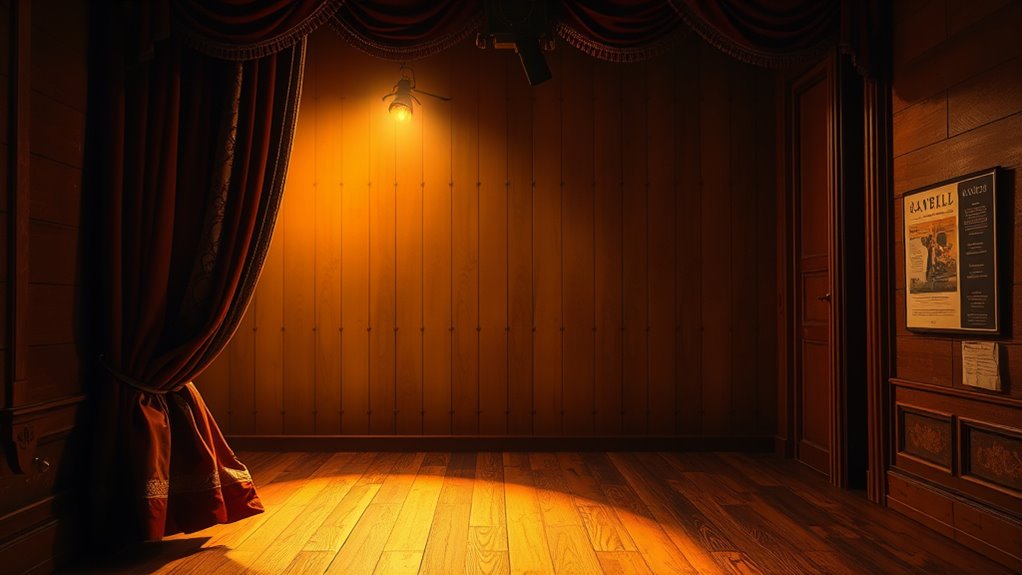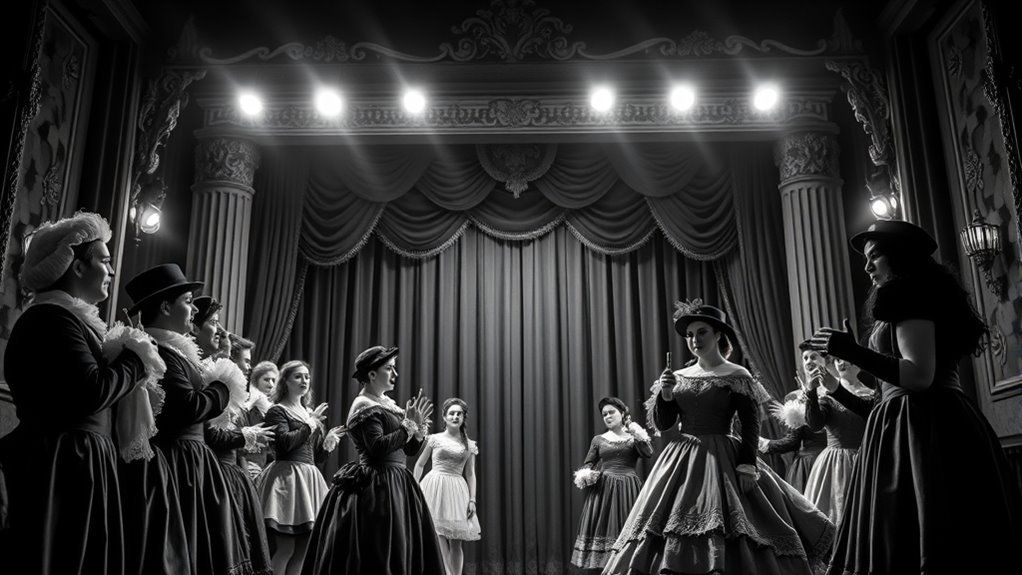The phrase “break a leg” comes from theatrical superstitions designed to ward off bad luck. Instead of wishing “good luck,” performers are encouraged to “break a leg,” which may symbolize performing so well that you “break” the success line or bow deeply. It’s rooted in Elizabethan traditions where superstitions influenced language and gestures. Curious about how this phrase transformed into a positive wish? Keep exploring to discover its fascinating history.
Key Takeaways
- The phrase originated as a theatrical superstition to wish performers success indirectly and avoid tempting fate with direct praise.
- “Break a leg” may refer to performing so well that one “breaks” the line of success or to bowing, symbolizing a successful performance.
- Its roots trace back to Elizabethan England, where expressions like “to bow” or “to curtsy” were linked to “breaking” decorum or the performance line.
- It evolved as a covert encouragement, transforming a curse into a positive wish to ensure a good performance.
- Today, “break a leg” is a widely used phrase that reflects how superstitions shape theatrical language and traditions.

Have you ever wondered why actors say “break a leg” instead of wishing each other good luck? It’s a phrase steeped in theatre superstitions and rooted in historical expressions that have persisted through centuries of show business. Unlike most professions, theatre has developed a unique set of superstitions designed to ward off bad luck and ensure a successful performance. Over time, these superstitions have given rise to phrases that seem counterintuitive or even jinxed, yet are embraced as part of the theatrical tradition. “Break a leg” is one such phrase, and its origins are as fascinating as the superstitions themselves.
Actors say break a leg to ward off bad luck and promote a successful performance.
In the early days of theatre, wishing someone “good luck” was considered bad luck, as it was believed that such a direct wish could actually bring misfortune. Instead, performers and audiences adopted indirect phrases to express their hopes for a successful show. One of these was “break a leg,” which might seem strange at first, but it’s actually tied to the idea of “breaking” the line of the performance—an expression that could mean to perform so well that you literally “break” the line of success. Alternatively, some believe that the phrase refers to bowing or curtsying so deeply that it resembles breaking the line of the legs, symbolizing a strong and enthusiastic performance.
The phrase’s roots can also be traced back to historical expressions and theatrical superstitions from different cultures. In Elizabethan England, for example, it was common to wish performers “to bow” or “to curtsy,” which could be interpreted as “breaking” the stature or the line of decorum through a successful performance. Over time, these expressions morphed into “break a leg,” possibly as a way to avoid tempting fate by directly wishing for good luck. It became a form of covert encouragement, a positive wish veiled in a phrase that, on the surface, sounds ominous.
Furthermore, the concept of superstitions in theatre demonstrates how cultural beliefs influence language, turning negative expressions into positive wishes. Many believe the phrase also has origins in the idea of “breaking the curtain” or “breaking the line,” referring to the opening night when actors would step past the curtain to perform on stage. If they performed well enough to “break” the line of the performance, it signified a successful show. Over the years, “break a leg” has become a symbol of wishing someone a stellar performance, despite its seemingly negative wording. It’s a perfect example of how theatre superstitions and historical expressions have shaped the language and traditions of show business, turning what might seem like a curse into an encouraging phrase that still resonates today.
Frequently Asked Questions
When Did “Break a Leg” First Become Popular in Theater?
You might wonder when “break a leg” became popular in theater. It’s believed that this phrase emerged in the early 20th century as part of stage traditions and theater superstitions. Instead of wishing good luck, which was considered bad luck, actors and crew started saying “break a leg” to bring luck and success. Its exact origin is uncertain, but it’s now a well-known phrase celebrated in stage culture.
Are There Similar Phrases Used in Other Entertainment Industries?
You’ll find that other entertainment industries have their own version of theater superstitions and performance rituals. For example, dancers might say “merde” in ballet, while musicians use “break a string” when wishing good luck. These phrases serve as playful, superstitious ways to ward off bad luck and guarantee a successful performance, much like “break a leg” does in theater. Each industry creates unique traditions to bring good fortune.
How Did Superstitions Influence the Phrase’s Usage Over Time?
Superstitious beliefs and theatrical folklore greatly influence how you use “break a leg.” Over time, performers embraced this phrase to counteract bad luck, believing that wishing someone good luck directly would bring misfortune. Instead, they adopted this ironic expression as part of theatrical superstitions, reinforcing it through tradition. This folklore keeps the phrase alive today, serving as a playful, superstitious way to wish performers success without tempting bad luck.
Is “Break a Leg” Used in Languages Other Than English?
You might wonder if “break a leg” is used in languages beyond English. In many cultures, similar idioms exist with unique linguistic adaptations, reflecting local superstitions and theatrical traditions. For example, in German, performers say “Hals- und Beinbruch,” meaning “neck and leg fracture.” These cultural variations highlight how different societies adapt idioms to convey good luck, demonstrating the universal nature of theatrical superstitions across linguistic boundaries.
Have Any Famous Incidents Contributed to the Phrase’S Popularity?
Did you know that theatrical anecdotes and superstitious origins boost the phrase’s fame? You might find it fascinating that a famous incident, like a 19th-century actor supposedly wishing another good luck, led to “break a leg” becoming a superstition. These stories spread quickly, making the phrase popular among performers, and cementing its place in show business lore. Such incidents continue to shape how performers wish each other success today.
Conclusion
So, next time you hear someone wish you to “break a leg,” remember it’s a charming way to send good luck without tempting fate. It’s a playful nudge, a hopeful wish wrapped in a phrase that dances around misfortune. Embrace the tradition with a smile, knowing that in the world of show business, a little bit of well-wishing can lead to great things. After all, sometimes a gentle nudge is all you need to shine.









